FOCUS ON
AN INCLUSIVE GREEN FUTURE

Celebrating World Environment Day and CENN’s 25th Anniversary PAGE 9
Ukraine Latest: Kakhovka HPP Dam Destroyed, Residents Being Evacuated
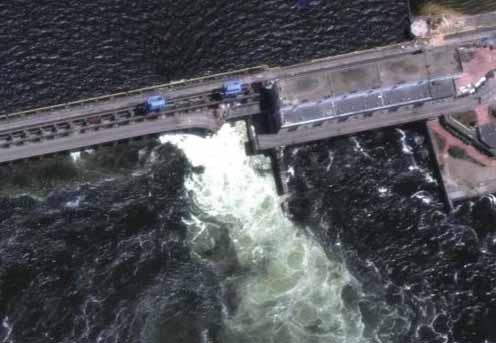
COMPILED BY ANA DUMBADZE
Emergency evacuations are underway in parts of the southern Ukrainian region of Kherson as a major incident unfolds following damage to the Kakhovka Hydroelectric Power Plant dam. Images and videos posted on social media by Ukraine President Volodymyr Zelensky and other officials show a massive surge of water heading through the damaged structure, putting thousands of residents downstream at risk.
Ukraine said the dam had been “blown up” by Russian forces Tuesday, with the South Command of Ukraine’s Armed Forces saying that “the scale of the destruction, the speed and volume of water, and the probable areas of flooding are being clarified.”
Damage to the Kakhovka dam has resulted in the flooding of 29 communities along the Dnipro river, Ukraine says. Thousands of people had been evacuated from their homes, and hundreds of thousands have no access to clean drinking water.
In this week’s issue...
UN Secretary-General - Message on World Environment Day
NEWS PAGE 2
All The King’s Men: Righting Georgia’s Geopolitical Azimuth
NEWS PAGE 3
Pavel Havlicek - This Was Showing a Middle Finger to the Moscow Leadership
POLITICS PAGE 5
Unlock the Beauty of the Georgian Language: Learn Online with Liberty
BUSINESS PAGE 8
Legal Insights with Klein Law: 1% Tax Rates for Entrepreneurs and Other Georgian Attractive Tax Rates


BUSINESS PAGE 8
CENN Reveals Student Competition Winners on World Environment Day
SOCIETY PAGE 10
Samtskhe-Javakheti: A Cultural and Natural Gem
SOCIETY PAGE 11
PreparedforGeorgiaTodayBusinessby
Issue no: 1402 • • JUNE 9 - 15, 2023 • • PUBLISHED WEEKLY
PRICE: GEL 2.50
Continued on page 2
Image source:
Maxar Technologies
UN Secretary-General - Message on World Environment Day


This World Environment Day is a call to beat plastic pollution, - UN Secretary General António Guterres noted on June 5.
“Every year, over 400 million tons of plastic is produced worldwide – one third of which is used just once.
“Every day, the equivalent of over 2000 garbage trucks full of plastic is dumped into our oceans, rivers, and lakes. The consequences are catastrophic.
“Microplastics find their way into the food we eat, the water we drink, and the air we breathe. Plastic is made from fossil fuels – the more plastic we produce, the more fossil fuel we burn, and the worse we make the climate crisis.
“But we have solutions. Last year, the global community began negotiating a legally binding agreement to end plastic pollution.
“This is a promising first step, but we need all hands-on deck.
“A new report by the UN Environment Program shows that we can reduce plastic pollution by 80% by 2040 – if we act now to reuse, recycle, reorient, and diversify away from plastics.
“We must work as one – governments, companies, and consumers alike – to break our addiction to plastics, champion zero waste, and build a truly circular economy.
“Together, let us shape a cleaner, healthier, and more sustainable future for all.”
Ukraine Latest: Kakhovka HPP Dam Destroyed, Residents Being Evacuated
Continued from page 1
Ukraine has warned that it could take “years” for affected farmland to recover.
Russia denied damaging the dam, saying instead that Ukraine had “undermined the structure.” Vladimir Leontiev, the Russian-installed mayor of Nova Kakhovka, the city where the dam is located, said “night attacks” on the facility had “led to the destruction of the valves” and that “water from the Kakhovka reservoir began to be uncontrollably discharged downstream,” according to Russian state news agency Tass.
RUSSIAN RESPONSE TO FLOODING 'EXACERBATING HARM' TO CIVILIANS
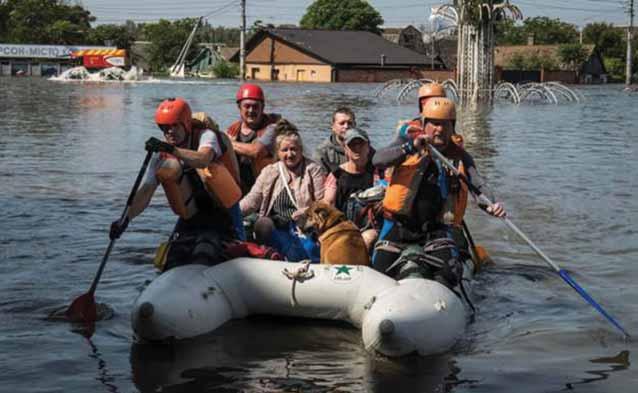
Russian forces and authorities in occupied areas responded to flooding with "a great degree of disorganization" which exacerbated harm to civilians, according to the Institute for the Study of War, Sky news reported Thursday morning.
In its latest intelligence update, the US-based thinktank said there were reports that Russian military personnel purposefully prevented civilians from fleeing the floods.
Kherson's Ukrainian administration adviser said that residents on the east bank of the Dnipro river, occupied by Russia, continue to shelter on their roofs for the third day with no food or water after Russian troops abandoned their positions and fled.
NATO CHIEF CALLS ATTACK ON KAKHOVKA DAM ‘OUTRAGEOUS’
NATO Secretary General Jens Stoltenberg slammed the attack on the Kakhovka dam in southern Ukraine on Twitter.
“This is an outrageous act, which demonstrates once again the brutality of Russia’s war in Ukraine,” the NATO chief wrote, adding that the attack puts “thousands of civilians at risk.”
WHITE HOUSE WORKING TO PROVIDE ADDITIONAL SUPPORT TO UKRAINE FOLLOWING DAM ATTACK
The White House said it was working with allies to provide Ukraine additional assistance following the destruction of the Kakhovka dam.
“The immediate focus is rightly on all the Ukrainians whose lives and towns and villages are affected by this flooding, and on making sure that they have the aid and assistance that they need,” National Security Council spokesman
John Kirby told reporters at the White House.
Kirby added that it was “too soon to assess what kind of impact this is going to have on the battlefield.” He also said the US is working with Ukraine to gather additional information about what happened.
Turkey's President Recep Tayyip Erdogan has called for a joint investigation, while British Prime Minister Rishi Sunak said the damage would constitute “the largest attack on civilian infrastructure during the war”, if it was found to be intentional, the BBC reported.
UN CHIEF SAYS HUMANITARIAN PARTNERS RUSH TO PROVIDE CLEAN WATER FOLLOWING DAM ‘CATASTROPHE’
United Nations Secretary-General Antonio Guterres said attacks on critical civilian infrastructure have to stop, as thousands flee the Kherson region following an attack on the Kakhovka dam.
Guterres told reporters at the United Nations that the UN does not have independent information on what had happened, but said, “One thing is clear: this is another devastating consequence of the Russian invasion of Ukraine.” He did not take any questions.
“Massive flooding, large-scale evacuations, environmental devastation, destruction of newly planted crops and added threats to the highly threatened Zaporizhzia Nuclear Power Plant — Europe’s largest nuclear facility,” he summarized. He called the act a “monumental humanitarian, economic and ecological catastrophe” and said the UN is rushing to provide clean drinking water for the area.
UKRAINE SAYS DESTRUCTION OF MAJOR DAM POSES THREAT TO EUROPE’S LARGEST NUCLEAR POWER PLANT
Ukraine’s state power agency said the destruction of a major dam in a Russiancontrolled area of the country poses an additional threat to Europe’s largest nuclear power plant, but the situation is under control.
Ukraine’s Energoatom said via Telegram, according to a translation, that “the water level in the Kakhov reservoir is rapidly decreasing, which is an additional threat to the temporarily occupied Zaporizhzhia nuclear power plant.
“Water from the Kakhovka Reservoir is necessary for the station to receive power for turbine capacitors and safety
systems of the ZNPP. The station’s cooling pond is now full: as of 8:00 am, the water level is 16.6 meters, which is sufficient for the station’s needs,” the agency said.
The International Atomic Energy Agency said via Twitter that it is aware of the reported damage at the dam and experts are closely monitoring the situation at the nuclear power plant. The UN’s nuclear watchdog added there was no “immediate safety risk” at the site.
UKRAINE SEEKS INTERNATIONAL JUSTICE FOR DAM EXPLOSION, ZELENSKY CITES WAR CRIMES
President Zelensky called the attack on the Kakhovka dam an “ecological bomb of mass destruction” in a nightly address. Zelensky thanked first responders for helping to evacuate people from the region and for assisting in other humanitarian efforts, such as providing clean drinking water.
“Such deliberate destruction by the Russian occupiers of the dam and other structures of the [Kakhovka Hydroelectric Power Plant] HPP is an ecological bomb of mass destruction,” Zelensky said on his official Telegram channel.
“It is very important now to take care of each other and help as much as possible. The whole world will know about
this Russian war crime, the crime of ecocide,” he said.
Zelensky also said that Ukraine’s prosecutor general had “appealed to the Office of the Prosecutor of the International Criminal Court to involve international justice in investigating the dam explosion.”
IN OTHER NEWS, UKRAINE SAYS IT DESTROYED A RUSSIAN POSITION NEAR BAKHMUT
The commander of Ukraine’s ground forces on Monday said Kyiv had destroyed a Russian position near the embattled city of Bakhmut in eastern Ukraine.
“The defense forces are working. We continue moving forward,” Oleksandr Syrskyi said on Telegram.
Bakhmut is of both symbolic and strategic importance to Russia, providing a stepping stone for Moscow’s forces to advance into the cities of Kramatorsk and Sloviansk in the Donetsk region.
Ukraine has reported advances of up to 1.1km (0.7 miles) in "various sections of the Bakhmut direction". But another senior official told Reuters that any assaults were localized, and that a longpromised, full-scale counter-offensive had not yet begun. For its part, Russia said recent attacks near Bakhmut were "unsuccessful," the BBC noted Thursday.
NATO COUNTRIES MAY END UP SENDING TROOPS TO UKRAINE
Some NATO countries may be willing to send troops to Ukraine if other member states do not provide security guarantees to Kyiv, a former secretary general of the military alliance has said, according to Sky news.
Anders Rasmussen was quoted by The Guardian as saying there is a "clear possibility" that NATO states could take action individually if the group cannot decide on a path forward for Ukraine.
"We know that Poland is very engaged in providing concrete assistance to Ukraine. And I wouldn't exclude the possibility that Poland would engage even stronger in this context on a national basis and be followed by the Baltic States, maybe including the possibility of troops on the ground," he said.
"We shouldn’t underestimate the Polish feelings, the Poles feel that for too long Western Europe did not listen to their warnings against the true Russian mentality."
NATO members have avoided putting boots on the ground in Ukraine or imposing a no-fly zone over the country, as it would bring Russian into direct conflict with their forces.
Instead, they have continued to provide billions in financial, humanitarian and military aid since the war broke out.
GEORGIA TODAY JUNE 9 - 15, 2023 2 NEWS
Image source: Reuters
All The King’s Men: Righting Georgia’s Geopolitical Azimuth
OP-ED BY MICHAEL GODWIN
For months, and some would say years, the divide between the wants of the Georgian people and the desires of the government have been rapidly polarizing. Even the most aloof among observers would see that the majority of the public clamors for European and NATO collaboration and membership. Meanwhile, the government, in the most favorable assessment, has dawdled upon, and at worst purposefully inhibited, these aspirations.
Using history as a poignant reminder, governments that operate perpendicular to the will of the people tend to have their political (and sometimes literal) lifespans curtailed. Be it from an internal and peaceful “color” revolution, an ousting by force of arms, or by foreign intervention, these entities dig their own proverbial graves by laying the legal and political groundwork to formulate their downfall.
Many of Georgian Dream’s supporters harken back to images of peace, foreign investment, and domestic investment. However, the truth is a mirror of the upcoming dilemma voters face in 2024 - the lack of any viable alternative. Since 2012, heavyweight party Georgian Dream, along with a small contingent of politically petit-figured allies, has thwarted opponents from the United National Movement (UNM) and its league of oppositionist parties.
Praise is well due; the government has launched several initiatives to draw more

investment, create jobs, and develop the nation’s infrastructure. Then came Russia’s full-scale invasion of Ukraine that, despite pro-Kremlin apologists' statements, was wholly intended to remove Ukraine as a functional state. The shockwaves of this sent a fissure between countries, communities, and even friend groups.
Unexpectedly, that splintering occurred in Georgia between the majority of the country’s population and its ruling party.
Georgia, being a victim of the Kremlin’s transgressions, was fully expected to join the likes of Poland, Latvia, Lithuania, Estonia, and a host of others that had first-hand recorded and witnessed the brutality of Moscow’s iron-fisted imperialist reach. However, in a shock to Brussels, Washington, and the collective West that took a stand against Russian aggression, Tbilisi slumped back in its chair, unmoving, unperturbed, and seemingly uninterested.
While hundreds and later thousands of volunteers from the country flowed into Ukraine to join resistance units and become professional soldiers in the Ukrainian Ministry of Defense, Tbilisi scowled. In response, so as not to be obtusely labeled as pro-Russian, the government authorized the shipment of non-military aid. Bandages, generators, and other non-combat supplies were sent, and while these were helpful, they were not the war-winning support Kyiv requires. Other non-government organizations filled the gap, sending drones, money for equipment, vehicles, and even on occasion privately acquired intelligence. Again, Tbilisi sat silent, content with its lackluster contributions.
Fast-forward into spring of 2023, and the ruling party has changed its spots once again. The party went from the passive position of nominal support to that of actively parroting Kremlin lines and rebuking Western leaders, who have continued to be ardent supporters and backers of Georgia. Then, rather than develop an alternative narrative, the party doubled down and took the route of least resistance by answering prying questions from the press with combative responses, and ultimately verbally sparring with formerly friendly politicians on social media.
Now, the party survives on two primary lifelines; its small but hardline base of supporters, and the cash cow that is Bidzina Ivanishvili. This small legion of supporters, unwavering in their blind allegiance, enshrine their place on the ballot. The virtually unlimited budget that Bidzina, or by his more satirical Russian moniker ‘Boris’, is one he has
reaped from post-Soviet corruption. This virtually endless flow of cash allows the party to give Ivanishvili and his cohorts the means to make certain “assurances”.
However, as a proverbial ship with multiple holes can only be fixed so many times, so too can the sinking ship that is Georgian Dream only be kept afloat for so long. Despite “all the king's men” attending to the fragile nature of the party, the sunset is on the horizon. A popular movement that has overwhelmingly urged the nation towards Europe cannot be ignored.
But there should be immense caution among these Westward aimed groups. In another similar proverbial tale, it may be in the very nature of a power-centric party. The tale of the scorpion and the frog tells the story of the two attempting to cross a river. The frog, wary that the scorpion may sting it, is convinced to help the scorpion by the argument that if he were to sting him, they would both drown, thus there is no incentive for him to do so. However, the scorpion does indeed sting the frog, apologizing to him as he does, for it is “just in his nature to do so.”
While the removal of the ruling party may remove some of the roadblocks to EU and NATO integration, it could also make the nation vulnerable and potentially create a power vacuum, drawing opposition parties against each other. Pro-Democracy and pro-European groups should thusly be wary. Just as both sides aim for the same European destination, it may very well simply be in the nature of Georgia’s “scorpion” to lash out and foil such attempts at integration with the country’s Western partners.
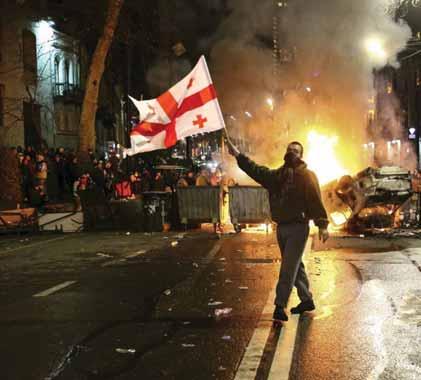
GEORGIA TODAY JUNE 9 15, 2023 3 NEWS
A protester waves a Georgian flag in front of a burning barricade.
Photo by: Zurab Tsertsvadze / AP
Geography and Power: Decoding Modern Geopolitics
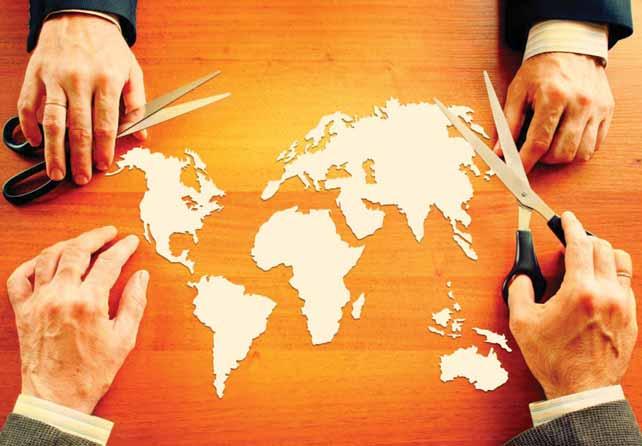
geography, which consists of rarely changing features, such as rivers, mountains, deserts, large forests, and seas. Geography conditions human behavior, and thus the behavior of entire states. Mountainous masses serve as a significant blockage against invaders and can also serve as an anchor for a nation which tries to be defended.
For instance, small Georgia managed to withstand successive invasions because it was inaccessible for many – mountains, gorges and a great number of rivers helped it. In Central Europe, the Carpathian Mountains served a similar role. For the Russian Empire’s westernmost frontier, the mountains were often seen as a natural border beyond which the empire would not place any significant claim.
out in other ways too. In China, a critical element to build a powerful polity was to maintain effective control over the Chinese heartland around the Yangtze and Yellow rivers, the second imperative was to hold onto peripheries from the desert in the north-west to mountains and jungles in the south and south-east.
Image source: knowledge.insead.edu
ANALYSIS BY EMIL AVDALIANI
Geopolitics is a tricky subject. The term is often used and abused by scholars and politicians in trying to explain what is presently happening in the world. Combinations of words such as “new geopolitical reality,” “geopolitical influence” etc. are used interchangeably with such fashionable terms such as “new order” or “political impact,” and others. This often leads to oversimplification, which often obscures
the intricate processes flowing underneath a certain military or political development.
Geopolitics extends beyond the present moment, goes back in history and helps forecast the future. In other words, correct understanding of geopolitics relates to things eternal, identified through the prism of geography and political power, and a reader needs to know how the things work which can allow them to pinpoint not only long-term developments in a certain region, but also understand the nuances underpinning those unfolding changes.
To do this, knowledge of history is
MEP Kaljurand: Relations between Georgian Gov’t and Western Partners Were Stormy Last Year
Relations between the Georgian authorities and Western partners, and especially with the European Parliament, were stormy and chaotic over the past year, – European Parliamentarian Marina Kaljurand said at the 12th session of the EU-Georgia Parliamentary Association Committee (PAC) in Brussels.
According to the Parliamentarian, in the coming months, the European Commission will assess the progress that Georgia has achieved in terms of fulfilling the 12 priorities.
“The implementation of the Association Agreement with the European Union is extremely important. This issue is even more relevant today, because in a few months the European Commission will assess the progress made regarding the 12 priorities that the Georgian authorities must fulfill if they want the country to be granted the status of a candidate for the European Union. We have a lot to discuss, and there is no need to hide the fact that relations between the Georgian authorities and the Western partners, and especially with the European Parliament, were stormy, and I would like to say chaotic, over the past year. I
am sure that you are familiar with the last two resolutions of the European Parliament regarding the violation of media freedom and safety of journalists in Georgia and the situation of former president Mikheil Saakashvili,” the MEP noted.
She noted that many difficult issues will have to be discussed at the meeting of the European Union-Georgia Parliamentary Association Committee.
“Let me start on a positive note: an opinion poll commissioned by IRI in April showed that 89% of Georgians approve of EU membership, an all-time high. The Georgian government and the parliamentary majority must now fulfill their promises not to us, but first of all to their citizens, who really aspire to join the European Union. As I said earlier, this is a window of unique opportunities and we don’t know how long it will be open, it can close quickly, so this historic chance should be used,” said the MEP.
Brussels is hosting the EU-Georgia Parliamentary Association Committee (PAC) 12th session, jointly led by cochairs Maka Bochorishvili and Marina Kaljurand.
Related Story: EU-Georgia Parliamentary Association Committee convenes in Brussels
critical. It provides a vast pool of examples from the past which can enable a reader to quickly understand the basics of the present dynamics. Historical parallels can be dangerous too, but the ability to differentiate between them is rooted in an adequate knowledge of the present and the past. Both are about understanding geopolitical processes and therefore first identifying such constants as geography and power.
Empires and nations have risen and fallen, great leaders are followed by lesser ones, and economic development varied from period to period and region to region. What is however constant is
In the northern part of Eurasia, we are confronted with Russia, often described as an irrational actor. Yet geography could elucidate important points as to why Moscow behaves in such a radical way as it presently does with its brutal invasion of Ukraine. Russia’s vast expanses are spread across the entirety of the northern part of Eurasia. But the very fact that no significant geographic barrier was in the way of Russian expansion, in many ways conditioned perennial Russia’s need to seek defenses, buffer territories, which in turn invited its annexation of additional territories until checked by a combination of European powers in the west, and Ottoman and Persian civilizations to the south. So, when Russia invaded Ukraine in 2014 and again 2022, it did so not only because of purely grand imperial motivations, but also because of its ingrained geographic vulnerabilities – open, largely undefended and therefore vulnerable borders – which from the Russian perspective would invite foreign military expansion. The nightmare of Charles XII’s of Sweden, Napoleon’s and Hitler’s invasions still live on in the psyche of the Russian political leadership.
The importance of geography can play
Control over the heartland has likewise been central to the rise of the United States as a global power. The Mississippi basin united the center of North America and allowed the nascent US from the Atlantic shore to extend toward the Pacific Ocean. In a way, the US has been an inevitable superpower. Its resources have allowed it to project power beyond its borders, and the specific geography pushed to dominate world oceans as a way to safeguard free trade and economic development.
But geography alone would not explain all the intricacies of a geopolitical process in a given region. There is also power – a second critical element in understanding how geopolitics works. Assessing power is a more delicate issue than the analysis of geography. Indeed, while the latter is static, power is fluid, and varies not only from region to region, country to country, and even a country can become radically different within short timeframe. For instance, materially much weaker state can at times be more successful in foreign policy than a traditionally more influential actor. Take Russia, whose capabilities are far behind that of the US or China. Yet Russia has been able for decades since the early 2000s to defy expectations of its decline, and actually to increase its regional clout even in the Middle East and Africa. Incorrect reading of Russia’s power led to the invasion of Ukraine and the near successful attempt to upend the present world order.
Emil Avdaliani is a professor of international relations at European University in Tbilisi, Georgia, and a scholar of silk roads.
UN General Assembly Adopts Resolution in Support of Internally Displaced Persons and Refugees from Occupied Territories of Georgia
In New York, the UN General Assembly adopted the resolution “Status of internally displaced persons and refugees from Abkhazia, Georgia, and the Tskhinvali region/South Ossetia, Georgia,” initiated by Georgia and backed by 63 countries.
As the Ministry of Foreign Affairs reported, 100 states supported the resolution.
The Ministry noted that Georgia has consistently presented this resolution to the UN General Assembly since 2008. The resolution strongly condemns the forced demographic changes carried out in Georgia’s occupied regions by Russia. It reiterates the fundamental right of internally displaced persons (IDPs), regardless of ethnicity, to return to their homes safely and with dignity, emphasizing the critical importance of respect for their property rights.
“Besides the humanitarian context, the resolution also has a practical impact, since it instructs the UN SecretaryGeneral to prepare an annual report on the situation of the displaced population living in Georgia and the implementation of the resolution. This is particularly important in light of the problematic human rights situation in the territories of Georgia occupied by Russia and the lack of international monitoring mechanisms, which is another obstacle to the safe and dignified return of internally displaced persons and refugees, and is
especially important now, when as a result of Russia’s aggression against Ukraine, a significant increase in the number of refugees and internally displaced persons has further aggravated the dire humanitarian situation in the world.
The resolution also calls on the Geneva negotiators to intensify their efforts to improve the security and human rights situation in the regions of Georgia occupied by Russia, which will facilitate the return of internally displaced persons and refugees to their homes,”
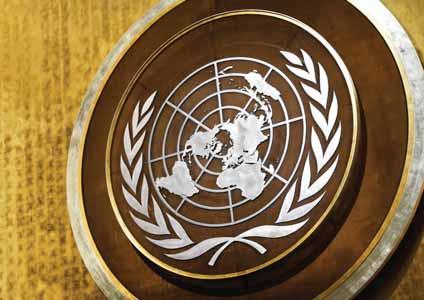
noted the Ministry.
During the discussion of the IDP resolution initiated by the Georgian side, supporting statements were made by the delegations of Australia (CANS – on behalf of Canada, Australia, and New Zealand), Lithuania (on behalf of NORDIC/BALTIC), the European Union, the USA, the United Kingdom, Japan, and Ukraine, who urged other UN members to support the resolution.
The Ministry of Foreign Affairs of Georgia thanked all the states that supported the resolution.
GEORGIA TODAY JUNE 9 - 15, 2023 4 POLITICS
Pavel Havlicek - This Was Showing a Middle Finger to the Moscow Leadership
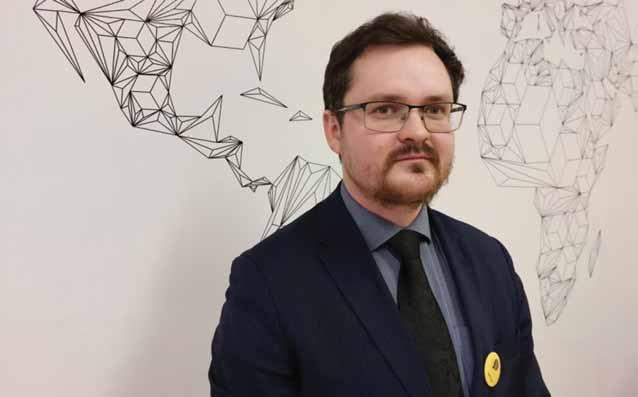
against each other that it's impossible to move anywhere.
HOW WOULD YOU RATE GEORGIA'S CHANCES OF GETTING EUROPEAN UNION CANDIDATE STATUS OUT OF LET'S SAY, 100?
At this point it is between 60 to 70. I think Georgia will actually get it by the end of this year, but not thanks to the government. It will be for the sake of Georgian citizens and for the sake of not completely falling through when it comes to the European foreign and security policy. We have to take into consideration the bigger picture; that, despite the government, things are being done for the country’s citizens. And we are basically, once again, in a very difficult position. Neither the government nor the opposition are making the situation any easier. They're both advocating for Georgia’s getting candidacy status, yet I have to say I think that if accession talks had not been opened for Ukraine and Moldova, Georgia by itself would not be likely to get candidate status.
Pavel Havlicek
Pavel Havlicek is Research Fellow at the Association for International Affairs. His research focus is on Eastern Europe, especially Ukraine and Russia, and the Eastern Partnership. RFE/RL sat down with him to discuss the main takeaways of this year’s European Political Community (EPC) summit in Moldova.
MOLDOVAN PRIME MINISTER SANDU STATED THAT, IF NEEDED, MOLDOVA IS READY TO ALLOW THE UKRAINIAN ARMY TO ENTER ITS TERRITORY, SEEMINGLY TO FACILITATE ACCESS TO MILITARY LOGISTICS COMING FROM THE WEST. COULD THIS HAVE BEEN A SUBTLE WARNING AIMED AT MOSCOW AND TRANSNISTRIA?
I think this was exactly the message. It is something that was being strongly pushed and advocated for by the 50 European leaders. There was really a very strong undertone of “OK, Moscow, we are here in Moldova, meeting 20 kilometers from the Ukrainian border, very much in solidarity with both countries, and we will not give up.” This was showing a middle finger to the Moscow leadership.
As for Transnistria itself, [initially] there was certain hesitancy. We heard many times, including from the foreign minister of Moldova, Nico Popescu, that the Moldovan authorities were skeptical about the repeated offers of Ukraine to run through the separatist territory, but this is actually now being changed. And we are seeing that there is definitely more of an appetite for it.
THIS EVENT ALSO SERVED AS A REHEARSAL FOR THE UPCOMING NATO SUMMIT IN VILNIUS. “THE DOOR IS OPEN, BUT WE CANNOT ADMIT A COUNTRY THAT IS CURRENTLY AT WAR,” SEEMS TO BE THE CONSENSUS.
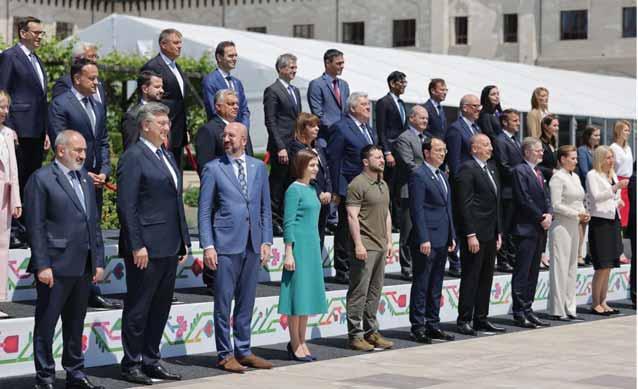
SHOULD WE EXPECT A REPEAT OF THE BUCHAREST 2008 SUMMIT SCENARIO?
We are in a “thin ice” kind of situation here. We really need to explore the limits very carefully. And fortunately, or unfortunately, these limits are very often dictated by the United States. This is a crucial power, and it is hesitant. I observed myself, during the GLOBSEC conference in Bratislava, that there was a high level of confrontation between representa-
tives of the Lithuanian Parliament, supported by Ukraine and governmental officials, and representatives of the security community of the United States. This is really a very emotional debate. Obviously, everybody understands that the Central and Eastern European countries are pushing strongly for Ukraine to not end up with a Bucharest 2.0, but we really have to be more careful, because there is a higher level of truth in what the US side is emphasizing: “Without our help, Ukraine would have been buried by now. What if Ukraine hadn’t got the US military help of 76 billion US dollars? What if Ukraine hadn’t got the US Patriot systems, how would they be coping with with the shells and rockets falling on Ukrainian cities?
CAN YOU OUTLINE THE REASON FOR THE US RELUCTANCE?
I think the primary one is that they consider the timing very sensitive. I think they would be much more open to returning to the discussion of Ukraine joining NATO after the war. This is a comfort zone for everybody. I still think they need a little bit more certainty on their side, you know, that things will not get out of hand. And, obviously, the big question mark is what happens if Ukraine joins and we are not able to deliver on Article 5.
Another reason is they consider themselves, so to say, Primus Inter Pares, the first among equals in delivering on the commitments, and that's why they are also the more hesitant. I understand that there are a high number of discussions taking place in Washington itself, and that there is mounting pressure on the President to at least deliver on some kind of roadmap, you know, whether we call that a MAP, or something else.
SO WHAT WOULD HAPPEN IF UKRAINE BECAME A MEMBER OF NATO AND THE ALLIANCE FAILED TO DELIVER ON ARTICLE FIVE? WOULD THAT AMOUNT TO THE END OF NATO AS WE KNOW IT?
Yes, pretty much. NATO as a credible force would disappear, and we would go back to something that Emmanuel Macron said during his speech in Bratislava, when he referred to NATO as a “brain-dead organization.”
PRESIDENT ZELENSKY SAID MOLDOVA AND UKRAINE BELONG IN THE EU. GEORGIA WASN’T MENTIONED. SO HAS THE ASSOCIATED TRIO BECOME THE ASSOCIATED DUO?
I think this is more and more the case. And I have to say that the Georgian leadership is more and more isolating itself.
The Prime Minister is actually becoming a pariah. Why? Because of what he said during the Bratislava policy conference, when he claimed the reason for Moscow starting the war was the NATO enlargement to Ukraine. He once again gave us reason to question the credibility of the Georgian political leadership. There are strong grounds in Brussels, in Washington and elsewhere, to consider Georgia an outlier among the Associated Trio. And its more and more a case that is so difficult, so paralyzed, that we just are scratching our heads trying to figure out what to do next.
YOU DON'T WANT TO TOUCH IT. Exactly. We don't want to touch it because we don't know what to do. Both parties, the government led by Georgian Dream and also the opposition, are so polarized
IS THERE ANOTHER CONSIDERATION THAT GEORGIA MIGHT GET IT, ALBEIT UNDESERVEDLY, BECAUSE BRUSSELS DOES NOT WANT THE COUNTRY FALLING DEEPER INTO THE RUSSIAN ORBIT, WHICH MAY WELL HAPPEN IF THE CANDIDATE STATUS IS NOT GIVEN?
This is exactly what we hear from Brussels and European policymakers, and also from people from the opposition: “If you don't give it, then there are really strong grounds that we will drift even further away.” And this will not be a pretty picture. We don't want that kind of failure. So this is, at the end of the day, something that we will just necessarily have to chew on.
There is also another argument - if Bosnia and Herzegovina was able to get this status, being much less prepared, much worse off in terms of implementation of acqui communitaire and all that, then it would be somewhat unfair not to give it to Georgia. And this would be strongly used by the government against the European Union, and we may well see an increase in those anti-European sentiments that the government seems very okay swinging around.
WE SAW YET ANOTHER ROUND OF PEACE TALKS BETWEEN ARMENIA AND AZERBAIJAN, ATTENDED BY CHARLES MICHEL, MACRON AND SCHOLZ, WITH ARMENIA SEEMINGLY CLOSE TO RECOGNIZING KARABAKH AS
AZERBAIJANI TERRITORY. WHAT CHANGES COULD THAT BRING TO THE REGION FROM THE GEOPOLITICAL POINT OF VIEW?
I was actually following the discussion that took place in Bratislava, just two days before the EPC summit, that further extended these talks and moved them to higher level. And, actually, despite the lengthy discussions and many unsolved issues, I saw in the room that there is, for the first time ever, a real willingness to agree, maybe reluctantly from the Armenian side, but still - I think there is a strong will.
At one point, it was mentioned that both sides would like to conclude talks in June, which is revolutionary and moves the picture forward very quickly. I'm very happy that this actually happened during talks facilitated by the European Union, and also in Washington, not only in Moscow, as it used to be.
Armenia is frustrated by the Moscow leadership in the region and is also frustrated by its leadership in the Collective Security Treaty Organization, which Armenia was presiding over -it was attacked openly by Azerbaijan, and Moscow did nothing beyond rhetorics and mediated talks.
We can see that the train is leaving, and Moscow is not sitting on it. We are seeing really revolutionary changes. Russia has provided this vacuum and Azerbaijan has taken the initiative. Now, its position is further strengthened by the re-election of Turkish President Erdogan. And there is no way out beyond talks. Obviously, Armenia is trying to negotiate the best conditions possible. And the French President being in the room was a sign that Europe is trying to do so too. Unfortunately, France is not always an unbiased actor in the process, and Azerbaijan’s perception of it at such maybe also be just. But the leadership of Charles Michel has been largely praised by both sides. And I'm very happy and very supportive of the return of European policymaking and return of European diplomacy and mediated talks by Brussels, especially if we consider the European mission on the border between Armenia and Azerbaijan. This is the first time ever, on the territory of the two countries, that European peace monitors are actually contributing to increasing mutual trust. And this is really significant, because without these conditions, and this will never be provided by Moscow, we would not have been able to get to this point. And I'm convinced that we will see the end of the process soon. And we have to do everything to have the two parties positioned as equally as possible, and to negotiate something that both parties are able to take back to their capitals and present to their citizens.
GEORGIA TODAY JUNE 9 15, 2023 5
POLITICS
Central and Eastern Europe is pushing for Ukraine not to end up with a Bucharest 2.0
Leaders of the EPC countries in Moldova last week. Source: EU/EEAS
INTERVIEW BY VAZHA
TAVBERIDZE FOR RFE/RL
PM: We Fought in Afghanistan, Iraq, though EU Candidate Status Went to CIS Country
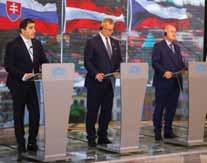
My remark in Bratislava caused much anxiety, – Georgia’s Prime Minister, Irakli Garibashvili, stated this week. “I said that one of the reasons why the war began in Ukraine was its desire to become a NATO member. I also added that I did not want to cite the Russian government’s statements referring to the question of why the war began.”
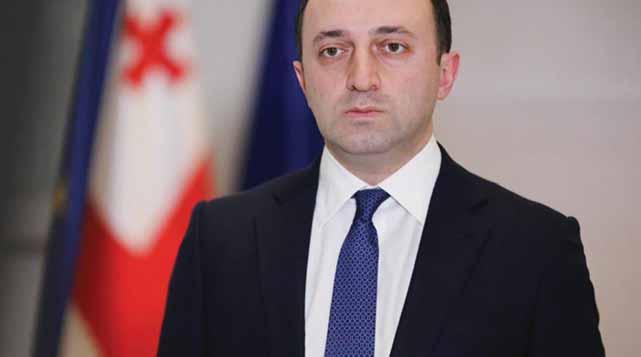
“The following day, President of the European Commission Ursula von der Leyen stated that one of the reasons was Ukraine’s aspiration to become a member of the European family, and French President Macron reflected the same.”
Irakli Garibashvili criticized his “wise critics” who “never stopped talking,” and urged them to readdress their criticism to the Presidents of the European Commission and France.
According to the PM, he had heard similar accusations about the war in Georgia – that the reason was Georgia’s Euro-Atlantic aspirations.
Speaker: Russia Must End Brutality that Has No Borders
The Speaker of Parliament, Shalva Papuashvili, on the explosion of the hydroelectric station in Kakhovka, stated that Russia must end the brutality that has no borders and which negatively influences everybody in the region and beyond.
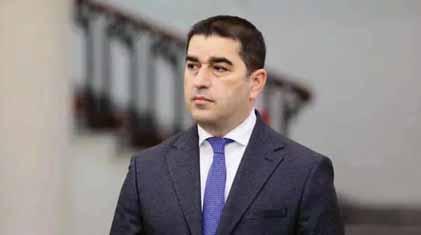
“The destruction of the Kakhovka HPP dam on the Dnipro River is yet
another irresponsible act with catastrophic consequences of the Russian war against Ukraine. Russia must end the brutality that has no borders and which negatively influences everybody in the region and beyond. We call on the EU and others with effective influence instruments to engage more vigorously to end this disaster,” Tweeted Papuashvili.
“I cannot explain. Simply, amid such a challenging geopolitical situation, why should any expert or former government member be interested in misinterpreting or creating incorrect sentiments?” he said.
Garibashvili stated Georgia has an army in full compliance with NATO standards.
“We fought a lot in Afghanistan, Iraq. Yet, Georgia’s EU candidate status was put into doubt last year, while a CIS member was awarded the status. Our irresponsible politicians did not react to this. This shows how they protect our country’s interests. This week, President Zelensky said that Ukraine saw no sense in attending the Vilnius Summit if no real promise would result. This was the Ukrainian President’s statement,” he said.
The PM urged reporters not to make TV stories around fake news. He also wished the country peace and stability.
“Everything will be all right regardless of the desires of evil wishers both inside and out,” he added.
Speaker: We Appreciate Support of Slovakia, Austria and Czech Republic
The Chairman of the Parliament of Georgia, Shalva Papuashvili, met with the Speaker of the Parliament of Slovakia, Boris Kollár, the President of the National Council of Austria, Wolfgang Sobotka, and the Speaker of the Chamber of Deputies of the Parliament of the Czech Republic, Markéta Pekarová Adamová this week.
After the meeting, the Chairman of the Parliament of Georgia, along with the Speakers of the Parliaments of Slovakia, the Czech Republic and Austria made joint statements for the press. As highlighted by the Chairman of the Parliament of Georgia, the cooperation of Georgia with the three countries proves to be multifaceted and long-term. He thanked the Speakers of all three Parliaments for supporting the sovereignty and territorial integrity of Georgia and the non-recognition policy of the occupied territories.
“We highly value this visit and the intensive communication that has been

achieved in this so very complicated geopolitical situation teeming with the challenges and in the period of utmost importance for Georgia at the EU integration path. This visit is a vivid manifestation of the highest support of Slovakia, Austria and the Czech Republic to Georgia. Georgia enjoys multifaceted and long-term cooperation with all three countries, and these three countries are strong supporters of the foreign political priorities and democratic reforms of Georgia. We are aspired to further enhance the dialogue with the Slavkov
Trilateral members which has been formed as a powerful political force within the EU and which serves as a good model of successful regional cooperation,” Papuashvili noted. As he underlined, the counterparts overviewed the progress that Georgia achieved in its EU membership path and expressed commitment to further bolstering the bilateral and multilateral cooperation.
“We truly appreciate the support of Slovakia, Austria and the Czech Republic to the European future of Georgia, and hope that the progress of Georgia will be duly valued by the EU, and that Georgia will receive the deserved EU candidacy at the end of the year. At the meeting, we expressed our commitment to enhancing bilateral and multilateral cooperation and estimated the positive development of parliamentary relations between our countries, including at the level of the Friendship Groups and we are eager to support the uninterruptedness of this positive tendency,” the Speaker noted.
Government Plans Construction of New, Modern Airport in Tbilisi

a 5- or 10-year project. We have analyzed two options. One is the development and expansion of the existing airport, but let’s allow more qualified specialists speak about it. This airport has its downsides and limitations, and in reality does not offer much opportunity for significant development, especially if we want to become the region’s aviation hub-this airport- its territory, does not allow for that.
modern, international-class airport realistically poised to become a hub. It must be an international class, transit-logistic airport accommodating the needs of modern passengers.
“We also discussed the construction of good terminals, and so on. We will discuss this topic in more detail in time, and I believe that this is a very ambitious and yet necessary project for the country.
We are working on the construction of a new, modern, international-class airport realistically poised to become a hub; and the former Vaziani Airfield in Tbilisi is an ideal location to this end, - stated Georgian Prime Minister Irakli Garibashvili.
The Prime Minister pointed to the existing airport’s downsides and limitations, saying that in reality, it does not
offer much opportunity for significant development.
Garibashvili noted that if Georgia wants to actually become an aviation hub in the region, the existing airport and its location do not allow for the achievement of this goal.
“I would say that this is a quite ambitious decision on our part, but I believe that today we have enough capabilities and experience, and-most importantlythe goal of becoming the region’s avia-
tion hub. We have said repeatedly that the country has the potential for this. And it is toward this goal that we started working.
“The Ministry of Economy has been working actively for a few months now. And, generally, I would like to offer my brief assessment of the existing airport. You probably agree that it is not satisfactory and does not meet the challenges and our ambitious goals. We plan to target a long-term project. It cannot be
“We raised this issue at the Economic Council meeting. We discussed it and concluded that, if we want to care about the country with 20-, 30-, 50-, or even 100-year prospects in mind, and if we want to hand down to our future generations proper infrastructure and a well-functioning airport, a new location must be sought. And the former Vaziani Airfield in Tbilisi is an ideal location to this end.
“On my instructions, the Ministry of Economy has been actively working in this direction over the past few months. To look over this project, we want to invite the best designers, builders, and architects, to inspect the location, and only then make a final decision. We are talking about the construction of a new,
“The existing airport meets today’s requirements, of course. But if we want to plan a long-term project, the implementation of a new, ambitious project is in order.
“Over the past few years, we have observed a 25% annual increase in the country’s passenger traffic, which is very good, of course. Georgia’s airports facilitate direct flights to 58 cities around the world, and we maintain regular flights to and from 31 countries. This is why we are now launching a study. We will invite leading global aviation consulting companies to engage in the process, and we will conduct a detailed study, and then will make a final decision. Tbilisi and the country deserve one of the best airports,” Garibashvili said.
GEORGIA TODAY JUNE 9 - 15, 2023 6 POLITICS
BUSINESS
The Essence of Economic Sanctions - Based on Accumulated Material and Practical Observations. Part 2
ANALYSIS BY VICTOR KIPIANI, GEOCASE CHAIRMAN
As for further escalation of sanctions, the advantage is on the side of the West, and this advantage is much greater than the retaliatory measures of a vengeful Russia.
In the aforementioned escalation, the space of Western advantage is created by a wide choice of possible additional measures. Let us mention just a few of them, which we consider to be the most important:
(1) The Russian financial sector has not yet been fully and completely extinguished by the sanctions policy: in this regard, there is still room for expanding the impact on the target;
(2) The leading actor in the Western sanctions coalition, the United States, has not yet implemented the so-called secondary sanctions, which involve penalizing foreign companies for transactions with Russian state and private companies;
(3) The Western sanctions policy has not yet used the so-called "full blocking sanction," which is explained by some conjunctural considerations;
(4) The challenge of third countries providing direct assistance to Russia to circumvent sanctions or other forms of support remains unresolved. In addition to the general issues or considerations discussed here, several "specialized" aspects require particular attention.
THE FINANCIAL "DUPLICITY" OF THE US DOLLAR: CHALLENGES TO DOLLAR HEGEMONY...
The central role of the US dollar in the international system is not only an economic factor, but also a factor related to geopolitical influences on the world stage. This is particularly evident in the context of the degree of effectiveness of sanctions, since control over financial flows is crucial to exert the necessary pressure on the object of sanctions. It has been said that "big countries manage big currencies," which is also the basis and condition of their great geopolitical weight.
However, as a result of the post-pandemic shock, attempts to rebuild the global supply chain and the impact of the Russia-Ukraine war, due to a certain fragmentation of the world economic system, the question arose with the following formulation: Will the US dollar maintain its role as a system-connecting currency in the global economy? And while at this stage a fundamental review of the status of the US dollar and its replacement with another currency (or
currencies) is not a near-term prospect (if at all), the talk that has already begun about the "influence" of the US dollar in the global monetary structure foreshadows the most extensive process since the introduction of the Euro.
As we said before, today the United States and the countries that support the central position of the U.S. dollar seem to have nothing to worry about: the US dollar is quite firmly established as the world's reserve and settlement currency.
payment processes. Both of these directions have one specific goal: to increase the role of their own currencies by reducing the role of Western currencies (the US dollar/Euro).
Suf
fice it to note that by the end of 2022, up to 60% of central bank reserves were held in US dollars. It has also been said that the impact of one particular currency (in this case, the US dollar) is critical to the effectiveness of large-scale sanctions measures and to ensuring at least a minimum level of order based on international norms.
At the same time, signs of the struggle for the redistribution of geopolitical influence using currency and payment instruments are already clearly visible: their essence, dynamics and, in some cases, the medium-term outline are clearly recognizable.
Let us try to summarize, at least briefly, the main "threats" to the dominance of the US dollar:
(1) Chinese and Russian tenfold efforts to build their own autonomous systems in the face of sanctions as a result of the renewed Russian invasion of Ukraine. Here we are mainly talking about payment platforms, the purpose of which should be to disconnect from SWIFT.
Beijing and Moscow have taken concrete steps in this regard, although their effectiveness is still far from desirable. For a better idea, we will only refer to a few numbers. In particular, the Chinese crossborder interbank payment system makes up to 15 thousand transfers of 50 billion per day, while the US equivalent - the clearing house of interbank payment system - makes up to 250 thousand transfers amounting to 1 trillion 500 billion a day. The difference is obvious.
Russia is also trying to achieve autonomy and self-sufficiency, an aspiration that became systemic after the annexation of Crimea in 2014. Though by February 2022, the Russian payment system had only 400 user entities, it is clear that the number has increased dramatically since the renewed invasion of Ukraine.
This is the case for autonomous systems operating on a so-called national basis. However, both China and Russia are seeking to expand the capacity of their systems by expanding cross-border cooperation. And this helps us identify the next group of risks in terms of the primacy of the US dollar.
(2) Recent developments include bilateral cooperation agreements between China and Russia, and between Russia and India, aimed at the convergence of
Parallel to this process, let us highlight China's policy of "internationalizing" its own currency. A good example of this is the use of so-called currency "swap" mechanisms with the central banks of different countries. The purpose of this mechanism is to give central banks access to the Yuan and buy it by exchanging the respective currencies into Yuan. The far-reaching intentions of this move by Beijing will be well understood by those who remember the US Federal Reserve's supply of the required amount of dollars to the world system through a "swap" during the 2008 financial crisis. At the time, the US "swap" saved global financial and settlement relations from collapse.
Also noteworthy is China's creation of other systems, such as digital payment systems, to provide liquidity for its own currency. Taken together, this set of measures aims to end the geopolitical hegemony of the US dollar.
(3) We also distinguish the factor of socalled regionalization as a separate risk group. For example, the BRICS countries are still studying the prospect of their reserve currency, although so far this process is not particularly successful. Speaking of the US dollar through the prism of regionalism, it is important how strong the role of the dollar will be in settlements for oil and other energy resources. Here, too, some alternatives have already been tested, namely China and Saudi Arabia are ready to pay in Chinese currency, and Russia and India - in Indian currency.
And these trends are clearly related not only to the future role of the U.S. dollar as the world's reserve currency, but also to the effective control of financial flows for the effectiveness of sanctions policy.
... AND (SO FAR) THE DOMINANT SIDE
Despite the above risks and challenges, the central importance of the US dollar for the practical purpose of sanctions and their possible high effectiveness will remain unchanged: at least for the foreseeable future. Let us look at several key circumstances that contribute to this perspective:
(1) The status of the US dollar as the main reserve currency in the world, as evidenced by the denomination of the US dollar in the foreign exchange reserves of central banks;
(2) The excessive use of the US dollar as the settlement currency by public and private subjects;
(3) Major investment by foreign enti-
ties in US Treasury Bills as a security with high liquidity reliability;
(4) The "pegging" of national currencies to the US dollar by individual countries: again, to increase the reliability of the national currency;
(5) The unity of interested countries for the effectiveness of sanctions policy. And such effectiveness will be difficult to realize without the unifying function of a specific international reserve and payment currency: precisely the function that the US dollar performs today.
It is clear that in relation to the latter circumstance, additional practical components determining unity are the scale of the sanctions coalition, as well as the number of countries that enjoy the security guarantee of the United States.
FOR THE "DEWEAPONIZATION" OF OIL?
Against the background of Western sanctions, one of the innovations is the introduction of an oil price cap to neutralize the "weaponization" of oil by Russia;

Specifically, the establishment of a ceiling price of $60 per barrel for Russian crude oil for maritime transport. Only if the price does not exceed the above threshold will EU tankers and insurance companies be allowed to transport crude oil to third countries and insure such shipments. It should be noted that the introduced measures also impose certain limits on the price of Russian oil products. However, the restriction imposed in terms of insurance is no less important than in terms of transportation, because up to 95 percent of tanker insurance policies worldwide are secured by reinsurance of European companies.
It is clear that the introduction of a price cap has a dual purpose: (1) to deprive Russia of additional revenues from crude oil exports and (2) to avoid significant disruptions or price fluctuations in global supplies by allowing crude oil exports in the world market at a ceiling price.
As for the EU itself, in accordance with
the decision of June 2022, import of Russian crude oil into the EU was banned from December 5 of the same year, and from February 5, 2023 - import of petroleum products was banned. The temporary easing is set only for EU countries whose geographical position does not allow them to immediately replace the supply of Russian oil through pipelines with alternatives.
As in the case of all large-scale innovations, the introduction of the price ceiling naturally gave rise to a number of problematic questions and objections. In fact, all of them are related to the full and consistent implementation of this mechanism. In particular, based on the fact that the main obligation to comply with the limit lies on the oil supplier and the recipient, to what extent is the relevant transaction protected against document forgery? Or, say, how big a challenge will it be for Russia or a third country to use vessels registered in the name of unknown or non-transparent owners in order to circumvent the price cap? It is also indicative that with the introduction of the limit, the traditional traders in the Russian oil market were replaced by new ones, mostly from Asia and the East. Other "proposals" were made to neutralize the negative commercial effect of the oil price cap. For example, an increase in the price of Russian wheat and other goods to compensate for the limit imposed on oil. The possibility of using insurance from nonEuropean countries (India, China, etc.) to compensate for this limit is also being considered, which, however, is associated with the payment of a much higher insurance premium.
In any case, it is a fact that limiting oil prices is a new word for sanctions approaches. In all other previous cases, whether against Venezuela or Iran, the sanctions imposed on energy carriers have been related to the volume of the resource supplied, not the price. Clearly, the coming months will give us more material for more specific opinions or conclusions.
The Penchant for Creating a Monster
A mushroom cloud formed after a nuclear strike. Image source: atomicarchive OP-ED BY NUGZAR B. RUHADZE

It all started with prehistoric Man inventing a stick so as to have better access to fruits that grew high in the trees. Subsequently, Man used the invention to beat others. Later came sharpened stones used as tools for digging the soil or
cutting meat. Subsequently, this was put to use slashing others' throats. Then came the wheel to make travel speedier, but in the end, it was utilized to catch up with a running foe and slaughter it.
All those little innovative devices gradually but inevitably turned from regular facilitators of life into monsters used to subdue fellow earthlings. But Man would not stop there.
Time passed and God’s wicked children
became smarter and handier in their ways of creating new tools with the potential to be turned into a variety of destructive appliances. The higher the intellectual development, the more complicated and menacing the discoveries became. Over time, breakthroughs came about, among them the invention of gunpowder, a new monster which was annihilating tens of millions of lives even centuries after it was introduced. But the biggest and scariest among the invented monsters was atomic power, which not only has the capability to light bulbs in our homes, but also possesses the terrifying potential to bring entire Mankind back to where it was sweating to create a stick to gather fruit or a stone knife to make food preparation easier. The celebrated split atom marked the outstanding explosion of human intelligence and was put to our good services forthwith, but it also placed us momentarily on the verge of a to-be-or-not-tobe stance provided its power were translated into nuclear combative potential. So another monster was born, which is
the aggregate nuclear arsenal of the world that might be put into commission any time if one of its owners gets angry with another and shoots the damn thing in a fit of fury.
What kind of distressing propensity of a human mind is that? Somebody came up with a sarcastic euphemism to obfuscate the shudder-giving word ‘nukes’ - the word ‘deterrent’ with a somewhat soothing, benign meaning, but as has recently been proved, the deterrent function of a nuclear weapon may in a matter of seconds be turned into sheer nonsense if the nuke-owning superpowers want to see each other off the surface of the Earth.
So, Godzilla is out there, not sleeping. The world’s neoliberal bunch thinks that it is sincere fruitful cooperation and mutual understanding that can save the Earth from Godzilla, denying any primacy of military power or political rivalry between nations. Nobody in the world could have imagined a full-scale war right in the middle of blissful, calm and cooperative old Europe, but that human proclivity to create monsters is right
there, and we are not willing to get rid of it.
A well-known politician once said that ignoring a problem does not mean that it goes away; conversely, it gets bigger, and sometimes comes back as a giant monster seeking to destroy us. This is an attitude, and probably a very wise one. We make choices, and oftentimes, those choices are so significant that Mankind's further fate might very well depend on them. The villains we tend to create are waiting for the right circumstances to gobble up their inventors. This might be true as we further develop the latest “monster,” the much talked about Artificial Intelligence. Incidentally, it is already in intensive use all over the place. What if it slips out of our controlling hand and, in its unrestrained advance, turns into something that is no longer subject to human management? If a once delightful moment of splitting the atom ended up creating a nuclear monster, why is it excluded that the forging of another monster like AI could not prove just as dangerous?
GEORGIA TODAY JUNE 9 15, 2023 7 BUSINESS
Image source: bm.ge
Unlock the Beauty of the Georgian Language: Learn Online with Liberty
We are delighted to unveil an exciting collaboration between Liberty and the Globalize platform aimed at empowering immigrants to learn the Georgian language online.

On the momentous occasion of Georgia’s Independence Day, May 26th, we proudly launched the Globalize NY conference at the iconic Webster Hall in New York City. This exclusive event provided Georgian businesses with a unique opportunity to showcase their exceptional products to the Georgian diaspora, technology innovators, investors, and other partners with vested interests in Georgia. The exhibition space buzzed with the presentation of export products from 30 esteemed Georgian businesses, including Liberty’s valued partner companies, enticing potential investors. Within the framework of this remarkable conference, Liberty made an exciting announcement—a pioneering program designed to assist Georgian immigrants and their families in learning the Georgian language online. Through extensive collaboration with Lingwing, the premier online language learning platform, we have meticulously developed a compre-
hensive basic course specifically tailored for mastering the Georgian language. Best of all, this course allows learners to embark on their journey from English to Geor-
gian, completely free of charge.
“At Liberty, we prioritize corporate responsibility, particularly in the realm of education and initiatives that promote our native language, both domestically and internationally. Our partnership with Lingwing has allowed us to bridge the gap and meet the needs of Georgians living abroad by creating an immersive Georgian language course. This course empowers them and their children to easily and independently learn their native language online or through our mobile application, all at no cost,” stated Tamar Zakariadze, Head of Corporate Responsibility at Liberty.
We take immense pride in empowering the next generation of Georgian immigrants to embrace and strengthen their connection to their native language.
It is truly inspiring that during the Globalize NY conference, we had the opportunity to meet Georgian immigrants residing in the United States on Georgia’s Independence Day and introduce this transformative project to them.
For more details about this groundbreaking program, please visit: https://bit.ly/43hb2VH
Tax Rates for Entrepreneurs and Other Georgian Attractive Tax Rates
Legal Insights with Klein Law: 1%
This is the second article of the regular Klein Law Group column. To read the previous article on setting up a company in Georgia, please visit the link below.


If you're looking to reduce your tax burden, one excellent solution is to consider moving your business and/or personal tax residency to a country with lower tax rates. Georgia, a country known for its attractive tax system, offers numerous benefits for tax residents and businesses. This article highlights why Georgia is an appealing option and provides a step-by-step guide to efficiently and legally move your taxes with minimal tax leakage.
Georgia has in place multi-prong programs for businesses, digital nomads and individuals.
WHY GEORGIA?
Georgia boasts several advantages that make it an enticing location for tax residency. These include:
Low tax rates for Individual Entrepreneurs - Georgia offers a flat 1% tax rate for individual entrepreneurs (sole proprietors) earning less than 500,000 GEL (approximately $190,000) annually. Above 500K GEL, individual entrepreneur rate is 3%. Employees also benefit from a flat 20% tax rate, regardless of income level.
Simple tax system - Unlike complex tiered tax systems, Georgia's tax system is straightforward, ensuring that even high earners pay only 20% on their entire income. Corporations charge VAT only once annual invoicing exceeds 100K GEL
(about $40K) which provides a competitive advantage for very young start-ups. Moreover, individuals (with no employees) with less than 30,000 GEL (about $11.5K) turnover can apply for Micro Business Status (0% tax).
Favorable business environment - Georgia has a low cost of living, simplified bureaucracy, and minimal regulations, making it easy to open and operate a business within just two working days.
High Net Worth Tax Residency program
- This program allows individuals with significant income or assets to become tax residents of Georgia without physically residing there, providing tax benefits in certain cases.
WHO SHOULD CONSIDER MOVING THEIR TAXES TO GEORGIA?
Moving your taxes to Georgia is benefi-
Image source: pbservices cial for individuals seeking lower tax rates. Regardless of income level, if you're paying higher taxes than desired and feel that the benefits and services received don't align with your contributions, relocating your tax residency to Georgia can be a solution.

First Klein Law Group column for Georgia Today: https://georgiatoday.ge/legalinsights-with-klein-law-the-ease-of-setting-up-acompany-in-georgia/ www.kleinlawgroupgeorgia.com
PM: Employment Indicator Grew to Historic High and Unemployment Declined to Historic Low
The Prime Minister of Georgia, Irakli Garibashvili spoke about the increased employment indicator today at the government meeting, noting that the employment indicator has grown to a historic-high level and unem-
ployment has declined to a historic-low.
“I wish to say a few words about the availability of jobs in the country. The number of employment opportunities was increased in Q1 2023, with 42,000 more jobs created, thus reaching 716,000.
It is a record-high number correlating
with employment in the private sector in first quarters. Inter alia, we had quite a high indicator in Q1 of 2020. Back the, the pandemic was already having an impact, but we still had 31,000. It was believed to be one of the best performance indicators. Now, a couple of years
later, we had an increase of 42,000 jobs in Q1 2023. This is very exciting information,” stated Garibashvili.
He noted that unemployment and poverty have dropped to a historic-low.
“Our Economic Team had a discussion on this topic last week. GeoStat released
data on this, evidencing that employment has reached a historic-high level. It may be said that unemployment has dropped to a historic-low, as has poverty, which has also dropped to a historic minimum,” concluded the Prime Minister of Georgia.
GEORGIA TODAY JUNE 9 - 15, 2023 8 BUSINESS
Moving your taxes to Georgia is beneficial for individuals seeking lower tax rates
Georgia boasts several advantages that make it an enticing location for tax residency
Towards an Inclusive Green Future - Celebrating World Environment Day and CENN’s 25th Anniversary
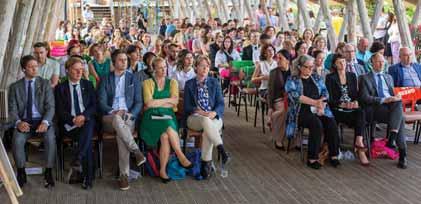
 BY KATIE RUTH DAVIES
BY KATIE RUTH DAVIES
CENN's momentous 25th anniversary coincided with a grand celebration held on June 5 at the iconic Stamba Hotel Rooftop. The event, dedicated to both World Environment Day and CENN's remarkable journey, drew together a distinguished gathering of diplomats, global development professionals, government officials, passionate environmentalists, media representatives, and influential business personalities.
Since 1998, CENN has been working with local communities and governments on regional initiatives to promote sustainable development and green growth. They have implemented up to 300 projects in the South Caucasus and laid the foundation for a greener future for all.
“We are honored to celebrate CENN's 25th anniversary on World Environment Day, which calls on the global community to create positive change through environmental actions,” said CENN Executive Director Nana Janashia as she welcomed the guests. “World Environment Day is the biggest international day for the environment, initiated by the UNEP 50 years ago. It is the largest global platform for environmental outreach and is celebrated by millions of people across the world. Today, we unite under the theme ‘Beat Plastic Pollution,’ a call to action that resonates across borders, cultures, and sectors. Plastic pollution has reached alarming levels, endangering our ecosystems, wildlife, and even human health. But we are not here to complain about it or dwell on the problem; we are here to confront it head-on,” she said, going on to thank the CENN team, partners, and donors present at the event.
“Your backing is instrumental in our efforts to advocate for policy changes, mobilize resources, and create an enabling environment for good governance and sustainable development. Your commitment to our cause empowers us to keep pushing forward, despite the challenges we face. Together, we have achieved incredible results to raise public environmental awareness, promote resource efficiency and circular economy, stimulate renewable energy, support sustainable agriculture, enhance waste management, protect biodiversity, and galvanize youth support for green values!” Janashia said.
Representatives from pivotal embassies in Georgia took center stage as they spoke of their profound objectives and strategic blueprints to propel environmental causes within the nation. A resounding tribute to their countries and organizations emerged, accentuating their roles in advancing Georgia's environmental agenda and driving the noble aspirations of the United Nations' Sustainable Development Goals (SDGs). A captivating glimpse into the diverse array of strategies and initiatives undertaken by stakeholders in the environmental realm ensued, enlightening guests with appealing prospects for future collaboration and partnership.
Minister of Environmental Protection and Agriculture of Georgia Otar Shamugia was in attendance, alongside Solomon
Pavliashvili, Deputy Minister, signifying and speaking about the commitment of the Georgian government to environmental sustainability.
“This world is for everyone, and Georgia’s part in protecting it is no less,” Deputy Minister Pavliashvili noted. “I believe the steps and reforms our government is working on will see positive results toward our goal to move closer to the EU and its sustainable development goals. We are ready today, tomorrow, to do what we need to do for a clean environment, prevention of climate change, to improve waste management, and to educate our youth to take this responsibility into the future.”
Pawel Herczynski, the Ambassador of the European Union in Georgia, which is CENN’s largest donor, addressed the audience, underscoring the enduring commitment of the EU to its longstanding partnership with Georgia and the nation's resolute environmental aspirations aligned with the United Nations' Sustainable Development Goals.
"'Take care of the Earth and she will take care of you'—a mantra often echoed but seldom truly heeded," queried Ambassador Herczynski, challenging the audience. "We are urged to 'Reduce, Reuse, Recycle,' but do we truly respond?"
As the world marked World Environment Day, the ambassador urged a collective action, emphasizing the profound interdependence between the planet's well-being and our own. Gratitude was extended to the Georgian government, the nation's civil society, and the commendable efforts of CENN for their unwavering commitment. Ambassador Herczynski reminded all that environmental degradation respects no borders, thereby necessitating a unified and collaborative effort to combat it.
Actively championing Georgia's environmental journey, the European Union has remained a stalwart partner, collaborating to safeguard landscapes, foster sustainable agricultural practices, generate economic growth opportunities, and more. Recognizing the transformative potential of civil society, the EU, in concert with CENN and the Georgian government, reaffirmed their unwavering support for green policies, the promotion of sustainable consumption, and initiatives that empower local communities.
“We believe in the power of civil society as a catalyst for positive change. The EU, in partnership with CENN and the Georgian government, will continue to advocate for green policies, promote sustainable consumption, and support initiatives that empower local communities. CENN’s dedication inspires us to do more and do better for our environment,” noted the Ambassador.
Ms. Rian Harker Harris, Deputy Chief of Mission at the US Embassy Tbilisi, highlighted the collaborative efforts between the green team and CENN in tackling the "Beat Plastic Pollution" challenge. Additionally, the USAID team has been working diligently with CENN to promote recycling programs across Georgia, fostering a culture of responsible waste management. These endeavors exemplify the shared vision of governments, civil society, and individuals coming together to address climate change.
“The Biden-Harris Administration has made environmental protection and climate action a priority,” Ms. Harris under-
scored. “The US is actively engaged in the development of National Parks and Protected Areas in Georgia, preserving the nation's natural landscapes for the benefit of all. Furthermore, collaboration with civil society partners and the forest service aims to mitigate the effects of deforestation and preserve biodiversity. The US also seeks to attract investment in renewable energy sectors such as wind, solar, and hydro, capitalizing on Georgia's abundant natural energy resources.”
Ambassador Maaike van Koldam of the Kingdom of the Netherlands emphasized the importance of shaping the future through collective action. The Netherlands supports CENN in cultivating a strong and vibrant civil society, witnessed through the formation of eco clubs in schools across rural areas. Ambassador van Koldam expressed admiration for Georgia's environmentally conscious school children, who have taken up the responsibility of saving the planet. She emphasized that working together is the key to driving meaningful change.
Marko Soldic, Charge d’Affaires of the Norwegian Embassy, highlighted the transformative potential of green transitions and the vital role played by investors, policymakers, and activists. Notably, the youngest generation is spearheading change, driving the global shift toward sustainable practices. He noted that Georgia and Norway can draw inspiration from larger trailblazers such as the EU, US, China, and India, and, by adopting well-designed regulations through the Association Agreement, Georgia can embrace pragmatic changes that improve the lives of its citizens.
Alexander Karner, Head of the Austrian Development Cooperation (ADC), commended CENN for its multi-faceted approach and its remarkable work with youth, particularly in rural areas. “The establishment of eco clubs in schools serves as an inclusive advocate for environmental protection. Additionally, CENN's policy work has helped foster a culture of compromise, facilitating delicate discussions on environmental issues,” he noted.
Lidija Christmann, Head of Development Cooperation at the German Embassy, emphasized the successful collaboration between Germany and CENN in waste management and the promotion of forest sector reform. The German government, through CENN, provides capacitybuilding support and plays a crucial role in environmental and biodiversity protection, climate action, and greenhouse gas reduction. This partnership exemplifies the commitment to fostering positive changes in the lives of ordinary people.
Sweden, through the "Save the Nature Georgia" program, collaborates with MEPA and other agencies to compre-
hensively address challenges related to biodiversity protection and restoration. Recognizing Georgia's progress in adapting its regulatory framework, Erik Illes, Head of Development Cooperation and Deputy Head of Mission at the Embassy of Sweden, stressed the need for a robust government management system to ensure sustainable reforms. “Despite improvements in waste collection, there remains a gap in translating aspirations into tangible action,” he said.
Sabine Machl, the UN Resident Coordinator in Georgia, highlighted the global plastic pollution crisis and Georgia's contribution to it. Astonishingly, the world produces 400 million tons of plastic annually, with only 10% being recycled. In Georgia alone, over 900,000 tons of waste is generated each year, with more than 75% ending up in landfills. Recycling programs are in place, but there is a pressing need for further expansion and diversification away from plastic. Ms. Machl stressed the importance of collective action in addressing gaps and fulfilling climate commitments. These thought-provoking statements and remarkable statistics serve as a reminder of the urgent need for collaborative efforts to safeguard our environment. The event at Stamba Hotel Rooftop brought together diverse voices, united in their dedication to a sustainable future.
The celebratory event held on June 5 went beyond mere festivities, delving into insightful panel discussions on key aspects of Georgia's climate change policy, green economic growth, sustainable rural development, and youth empowerment. The distinguished panelists, comprising representatives from public agencies, civil society, and the business sector, shed light on these pressing topics, fueling the conversation with their expertise and innovative ideas.
The first panel, titled "Climate Change, Environment, and Energy," kicked off with Nino Tkhilava, Head of the Environment and Climate Change Department at MEPA, who shared insights on "Driving Climate Action through MultiStakeholder Dialogue." The discussion then shifted to the "Long-Term LowEmission Development (LED) Strategy of Georgia," presented by Nino Antadze, UNDP's Team Leader for Energy and Environment Portfolio. Natia Tsikaradze, Head of SDGs Council Secretariat, addressed the audience on the topic of "Accelerating Progress towards the SDGs," while Carl Amirgulashvili, a representative of MEPA, delved into the theme of "Harnessing Nature-based Solutions (NbS)."
The second panel, skillfully moderated by Irine Kikvadze, an energy efficiency expert and Procredit Bank of Georgia
representative, focused on "Green Growth and Rural Development." Elene Margishvili from IRAO, Vienna Insurance Group, discussed the crucial role of the private sector in advancing sustainability. Giorgi Abuladze, representing Keda LAG, one of EU’s astounding legacies for empowering local communities and socio-economic conditions, delved into innovative approaches for community-led development. Naira Bolkvadze, a member of Women Agricultural Cooperative Green Maradisi, highlighted the importance of "Climate-Resilient Agriculture: Strengthening Rural Livelihoods in a Changing Climate."
The third and final panel, moderated by Lado Apkazava, Chibati School, Teacher of the Year of 2017, ignited a whirlwind of emotions within the audience, and was nothing short of a captivating symphony of empowerment and inspiration. The panel, named "Youth Development and Women Empowerment," brought together a formidable lineup of trailblazers who stirred the hearts of all present. Tamar Sulukhia from ISET spoke of the introduction of a circular economy master’s degree for the first time in Georgia, while Samira Bairamova, a fearless activist from Marneuli, exuded a raw courage that resonated with the room when she spoke of her own experiences as an activist and bridging the gap between the Georgian society and ethnic minorities. Mariam Abramishvili, a beacon of hope and an embodiment of dedication, representing Sachkhere #2 Public School, also touched the audience when she spoke about her personal journey through the Niko Ketskhoveli School Awards.
During the event, Nana Janashia, CENN's Executive Director, issued a powerful call to action, urging politicians, municipalities, companies, and civil society groups to join forces in the battle against environmental degradation and plastic pollution. Janashia emphasized CENN's remarkable journey of 25 years at the forefront of environmental protection and sustainable development in the Caucasus region. With a team of 70 dedicated individuals, most of whom are younger than CENN itself, the organization brings fresh perspectives, innovative ideas, ambitious goals, and unwavering passion to the table.
CENN's impact extends far beyond the capital, reaching all regions of Georgia, and even expanding its efforts in the broader Caucasus region. Through collaboration with partners, CENN has successfully implemented approximately 300 projects, transforming lives and landscapes. Guided by values of integrity, diversity, collaboration, and a positive approach, CENN unveiled a new strategy during the event, aiming to amplify its impact and effect change on a larger scale.
“Together, we must and will beat existing challenges, not only for ourselves but for future generations, who deserve a healthier, fairer, and more sustainable world.”
***
Before dinner and networking, the guests got to enjoy the awards ceremony of students participating in the competition “Climate Change and its Impact on Georgia.” Turn to page 10 to find out more about the competition and to see who won.
GEORGIA TODAY JUNE 9 15, 2023 9 SOCIETY
CENN Reveals Student Competition Winners on World Environment Day
awareness of climate change issues in the field of academia and to encourage scientific orientation among students. Articles created by participants needed to cover the consequences and risks caused by global climate change in relation to Georgia and be based on desk research, review and analysis of recent articles on climate change.
Suggested topics included:
• Climate change and adaptation
• Climate change and mitigation
• Climate change and natural disasters
• Climate change and biodiversity
• Climate change and water resources
• Climate change and climate-smart agriculture
• Climate change, energy efficiency and renewable energies
BY KATIE RUTH DAVIES
CENN, with the support of the European Union and in partnership with Ilia State University, within the framework of the “Georgian Climate Action Program (GEO-CAP)” project, ran a student competition on the preparation of scientific articles on the topic of climate change.
On June 5, World Environment Day and CENN’s 25th anniversary, the winners were awarded.
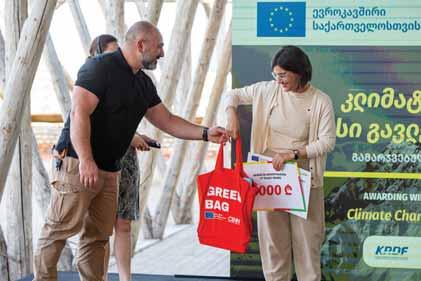
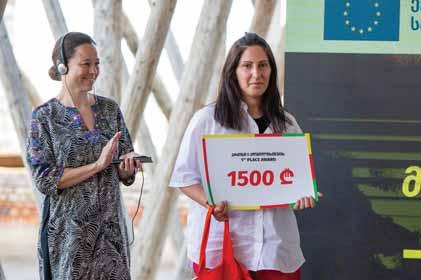
The aim of the competition was to raise
The articles were evaluated by a competent jury consisting of representatives of CENN and Ilia State University. The authors of all articles that passed to the second stage were given a certificate of participation, while the 10 highest-scoring articles were presented and the winning three authors were awarded (1st place – 1500 GEL, 2nd place – 1200 GEL, 3rd place – 1000 GEL).
3rd place went to Maka Papashvili, from the National University of Georgia, with the theme "Agriculture resistant to climate change and its development in Georgia," was awarded 1000 GEL and a certificate from the EU, CENN & ILIuni.
2nd place went to Tea Imnadze, from the Agricultural University, who wrote on
Mr. Velvet Scoter (მისტერ
გარიელი) - The Story of a Long Lost Caucasian Treasure
On a mountainous, volcanic plateau in southern Georgia, a long lost treasure has been found. This treasure, the Velvet Scoter, a diving duck, the last of its kind in the entire Caucasus.
The home of this story is the single island of Lake Tabatskuri in the Samtskhe–Javakheti region.
In 2016, Nika Paposhvili was a young, ambitious master’s student at Ilia State University when he took on the challenge to go on a wild duck chase across the lakes of Georgia. His discovery of
Tabatskuri’s velvet scoters changed everything for Nika, as he went on to commit his life to this bird, and support its battle against extinction.
Now a PhD candidate, for the last six years, Nika has worked year-round to protect this small and highly vulnerable population. Whilst protecting scoter life in Tabatskuri, he balances family life in the capital, Tbilisi – where his young family both cheer him on, and excitedly await his returns.
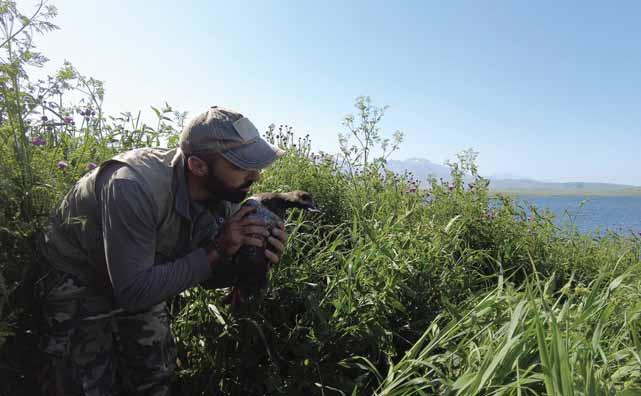
Saxon Bosworth’s new film, Mr. Velvet Scoter (მისტერ გარიელი) explores the life of Nika Paposhvili, the village of
Tabatskuri, and the vulnerable Velvet Scoter.
Premiered at Ilia State University on May 31, Mr. Velvet Scoter ( მისტერ
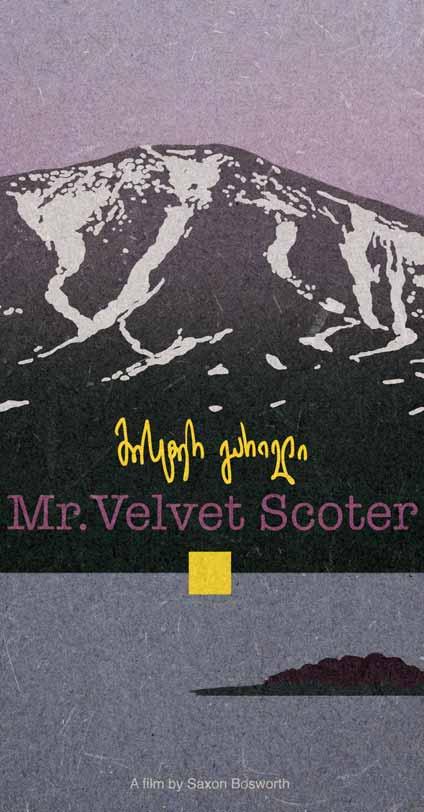
გარიელი), is now available to watch freely on YouTube. The film is with English subtitles, and comes with optional Georgian and Armenian subtitles. This is the final piece of a wildlife conservation trilogy Saxon made, coming after “Like an Animal” and “Vanishing Sky Lords”, both released in 2022, and also available on YouTube.
You can follow Saxon’s future projects on Instagram, @saxonbosworth.
the theme "Climate change affects grape and wine plants and intelligent viticulture." She was awarded 1200 GEL and a certificate from the EU, CENN & ILIuni. In 1st place was Mariam Kiladze, from Ilia State University, with the topic "Biochar and climate agriculture in Georgia". She won 1500 GEL and a certificate from the EU, CENN & ILIuni.
The competition was organized within the EU-funded project “Georgia Climate Action Project (GEO-CAP), which is being implemented by CENN with its partner organizations KRDF, ACU, YPU, and RLS-ADA. The project had four focal regions in Georgia: Guria, Imereti, Kakheti, and Racha-Lechkhumi and Lower Svaneti.
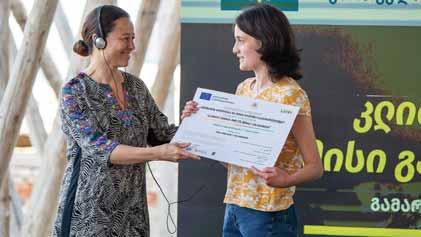
GEORGIA TODAY JUNE 9 - 15, 2023 10 SOCIETY
Samtskhe-Javakheti: A Cultural and Natural Gem
Some have cultural heritage status, yet still many are left without care. The oldest dwellings count around three centuries. Some Meskhetian villages also boast Oda houses (another type of traditional house widespread in Georgia), that are adorned with carved wooden patterns. This type of house is well-preserved here in comparison with other regions and has immense tourist potential. These old villages could be renovated back to their original appearance and turned into tourist attractions. In 2007, there were intentions to put these villages on the tourist map, but the plan was forgotten. The current tourist route covers only such basic and popular places like Vardzia, Akhaltsikhe, Borjomi, and is restricted to a one-day route that is not enough. In terms of domestic tourism, Samtskhe-Javaketi needs at least a threeday tour.
BY LIKA CHIGLADZE FOR WHERE.GE
The peak tourism season is fast approaching and soon large numbers of tourists will be heading to the most popular regions of Georgia, most to well-known places like Svaneti, Kakheti and Adjara. Often, one of Georgia’s most important and culturally rich provinces, Samtskhe-Javakheti, is left out of sight, yet, in the 9th and 10th centuries it was the most highly developed region both culturally and economically. Javakheti is notable for its beautiful landscape and large number of lakes and cultural monuments, in particular. We talked with Giorgi Maghradze, an archeologist who works at the Shota Rustaveli Museum in Aspindza, about the importance and huge tourist potential of Samtskhe-Javakheti.
WHY IS SAMTSKHE-JAVAKHETI SO SPECIAL AND WHY DOES IT NEED TO BE TURNED INTO A TOURIST ATTRACTION?
Javakheti was inhabited by people from ancient times. The artifacts discovered in Akhalkalaki date back to pre-historic times. In the Middle Ages, SamthskheJavakheti was the center of southern Georgia, and while other parts of the country were being invaded, this part was flourishing.
During this period a number of cultural monuments and fortresses were built. The first thing that come to one’s mind when thinking about Javakheti is the
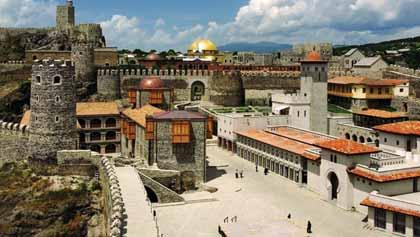
Megalithic culture and giant monuments similar to Stonehenge. These Megalithic monuments can be seen even from afar.
The Abuli and Shaori fortresses represent Cyclopean fortresses that date back to the 8th century B.C. Abuli is made of two fortresses and is surrounded by a massive stone wall, each with a width of around three meters.
Megalithic culture denotes monuments and fortresses built with giant stones. These fortresses were built with 3-4meter volcanic basalt blocks using the dry masonry technique, so it is believed that these monuments were built by giant people. Megalith Menhirs are yet another mystery of the Caucasus and a treasure of Javakheti: large stone pillars with various ornaments and symbols that can be seen throughout Javakheti, one of them at Paravani Pass. They say these pillars were used to direct travelers on their way, as well as representing idols of fertility. These pillars had a bull’s head carved on them, or a phallus, and were believed to give fertility to women; symbols of a pagan cult still standing in places, and still used by locals asking for fertility.
Another distinguished monument is the Saro Fortress, a complex that incorporates three fortresses, the distance between each around 200 meters. Close to these fortresses is the Church of the Archangels. Also nearby are traditional Meskhetian halls, dwellings spread throughout entire eastern part of Georgia. Unfortunately, most of these important cultural heritage sites were destroyed in the Kartl-Kakheti region and now can be found only in Samtskhe-Javakheti.
Samtskhe is notable for the Zarzma Monastery, Abastumani Observatory and a unique forest that was frozen during the ice age, seen within the rocks at the Goderdzi Pass which connects Samthske to Adjara. I find it strange that this source is still unexploited by geologists, botanists, etc. The region needs to be planned properly so that the synthesis of natural landmarks and cultural monuments will attract more internal tourists as well as foreign visitors.
Apart from the well-known Vardzia complex, the Tmogvi Fortress (built during the Middle Ages), Artanuji (5th century) and Samshvilde (3rd century BC) are three rare historic fortresses that one should definitely see. The Vani caves (a cave monastery built in the rocks) is also a very important historic site. Its walls preserve passages from the earliest version of epic Georgian poem Knight in the Panther’s Skin made by nuns in the 15th century. There are also excerpts from Persian poetry performed 5-6 centuries ago. These are real masterpieces that need to be protected, but, unfortunately, we have seen many examples of vandalism in the Vani Complex.
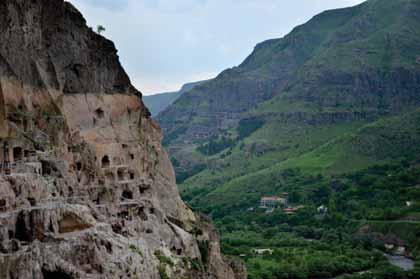
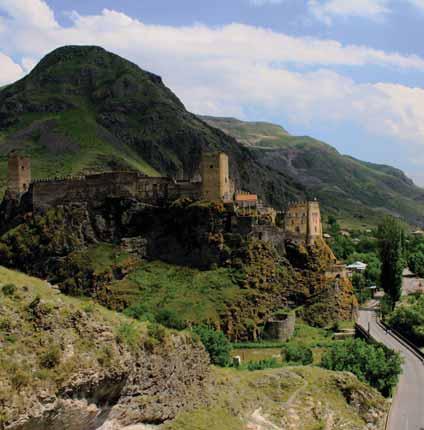
WHICH MONUMENTS ARE IN DANGER AND REACQUIRE RESTORATION?
Samtskhe-Javakheti, and particularly Javaketi province, are abundant with
cultural heritage sites and monuments, so it is hard for the government to take care of, renovate and protect all of them at once. Although some buildings are undergoing rehabilitation, there are a number of monuments that need urgent restoration works. These monuments have fallen victim to environmental damage and vandalism. The monuments that need urgent repair are the St Marine Church (14th century) of Tmogvi Fortress, Sazvartei Church (10th century), Tsitelsakdari Church in Tabatskuri (10th century), Toki Monastery (9th century), St George Church (9th century), Vardistsikhe Church (13th century), and the Damali St George Church (7th century). But in the first place, we need to change the mindset of the community who live there and their attitude toward cultural heritage sites and monuments. They should realize the importance of cultural landmarks and take care of them. We have specific laws imposing punishments on acts of vandalism, yet they are not effective.
WHAT ARE THE UNIQUE GEOGRAPHIC FEATURES OF THIS REGION?
Apart from its historic significance and
importance during different periods of the Kingdom of Georgia, the area is graced with unique nature. Javakheti is rich in lakes- the place counts around 80 small and big lakes. Moreover, it is home to the biggest lakes in Georgia: Paravani, Sagamo, Khanchali Lake and Tabatskuri. Migrating birds usually stop at Khanchali Lake, making for an amazing scene and attracting tourists of various tastes.
The region is notable for its volcanic plateau and volcanic rocks. Abuli Mountain is its most famous and highest peak (3300 meters).
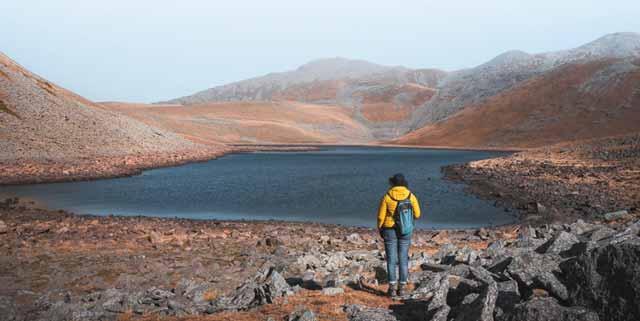
Javakjeti is beautiful year-round. In winter, when the lakes are frozen, lake tours are organized. Javakheti also boasts canyons, such as the Paravani and Mtkvari gorges. One can enjoy amazing panoramic views here. There are also a number of waterfalls that impress tourists and hikers. The area is dotted with stone columns similar to the ones in Cappadocia. Many of them have a human shape, so we call them “stone men.” I think this region is a unique treasure of the country from both a historic and geographic perspective. It is really a must-see place for locals as well as foreign tourists.
PUBLISHER & GM
George Sharashidze
COMMERCIAL DEPARTMENT
Commercial Director: Iva Merabishvili
Marketing Manager: Natalia Chikvaidze
EDITORIAL DEPARTMENT:
Editor-In-Chief: Katie Ruth Davies
Journalists: Ana Dumbadze, Vazha Tavberidze, Tony Hanmer, Emil Avdaliani, Nugzar B. Ruhadze, Michael Godwin, Ketevan Skhirtladze, Mariam Mtivlishvili, Erekle Poladishvili
Photographer: Aleksei Serov
Website Editor: Katie Ruth Davies
Layout: Misha Mchedlishvili
Webmaster: Sergey Gevenov
Circulation Managers: David Kerdikashvili, David Djandjgava
ADDRESS 1 Melikishvili Str.
Tbilisi, 0179, Georgia
Tel.: +995 32 229 59 19
E: info@georgiatoday.ge
F: GeorgiaToday
ADVERTISING & SUBSCRIPTION
+995 555 00 14 46
E-mail: marketing@georgiatoday.ge
Reproducing material, photos and advertisements without prior editorial permission is strictly forbidden. The author is responsible for all material. Rights of authors are preserved. The newspaper is registered in Mtatsminda district court.
Reg. # 06/4-309
GEORGIA TODAY JUNE 9 15, 2023 11 SOCIETY GEORGIA TODAY
Levanis Lake. Source: goingthewholehogg
Vardzia cave complex. Source: georgiantravelguide
Rabati in Akhaltsikhe. Source: georgianholidays
Khertvisi fortress (II century BC). Source: bestplace
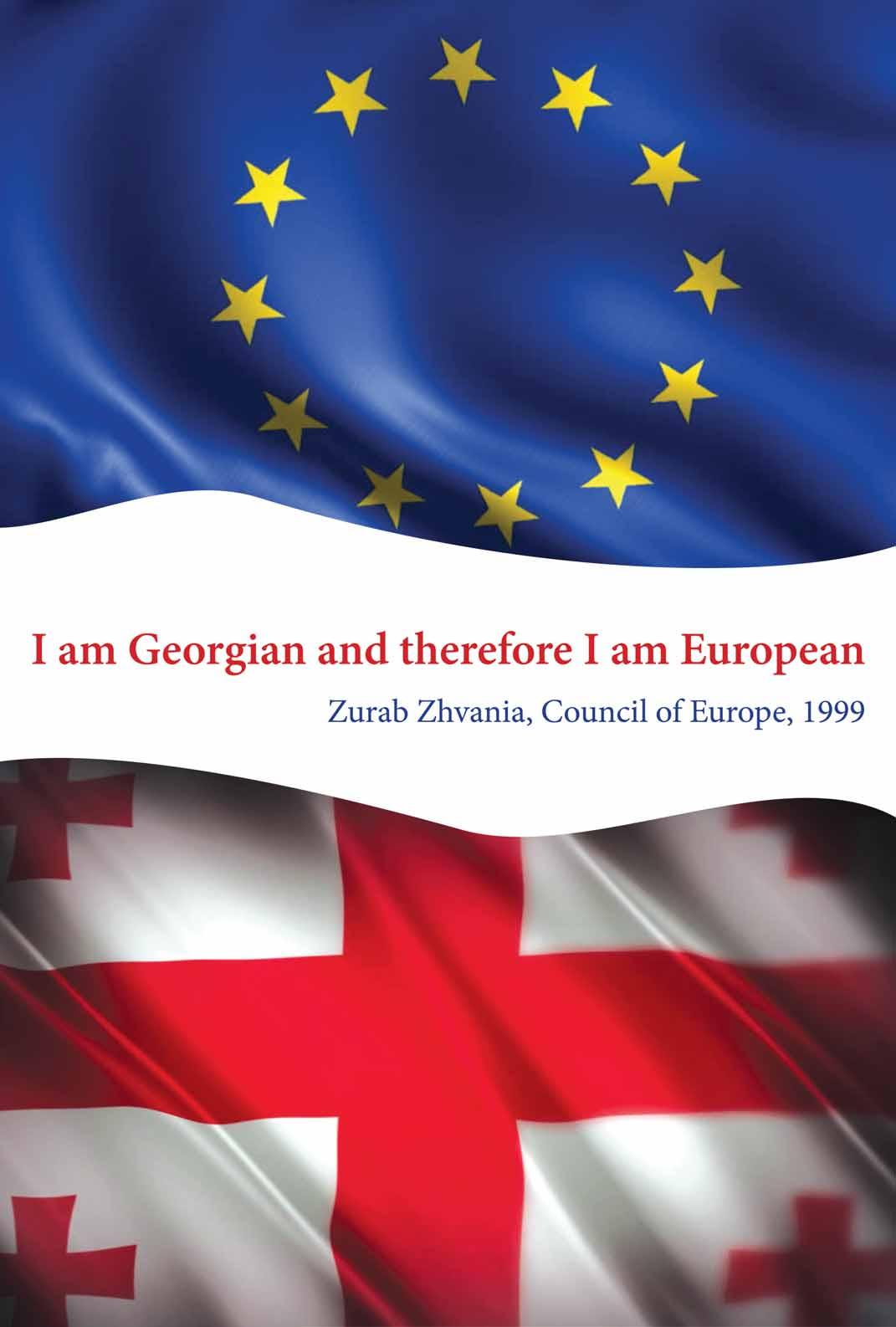























 BY KATIE RUTH DAVIES
BY KATIE RUTH DAVIES









